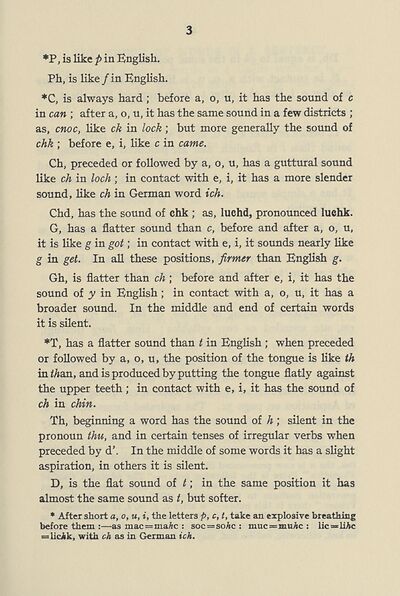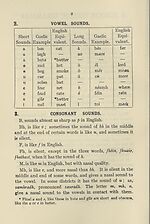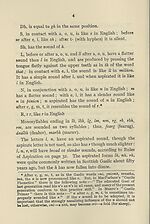Download files
Complete book:
Individual page:
Thumbnail gallery: Grid view | List view

3
*P, is like p in English.
Ph, is like / in English.
*C, is always hard ; before a, o, u, it has the sound of c
in can ; after a, o, u, it has the same sound in a few districts ;
as, cnoc, like cfi in lock ; but more generally the sound of
chk ; before e, i, like c in came.
Ch, preceded or followed by a, o, u, has a guttural sound
like ch in loch ; in contact with e, i, it has a more slender
sound, like ch in German word ich.
Chd, has the sound of chk ; as, luchd, pronounced luchk.
G, has a flatter sound than c, before and after a, o, u,
it is like g in got; in contact with e, i, it sounds nearly like
g in get. In all these positions, firmer than English g.
Gh, is flatter than ch ; before and after e, i, it has the
sound of y in English ; in contact with a, o, u, it has a
broader sound. In the middle and end of certain words
it is silent.
*T, has a flatter sound than t in English ; when preceded
or followed by a, o, u, the position of the tongue is like th
in than, and is produced by putting the tongue flatly against
the upper teeth; in contact with e, i, it has the sound of
ch in chin.
Th, beginning a word has the sound of h ; silent in the
pronoun thu, and in certain tenses of irregular verbs when
preceded by d\ In the middle of some words it has a slight
aspiration, in others it is silent.
D, is the flat sound of t; in the same position it has
almost the same sound as t, but softer.
* After short a, o, u, i, the letters p, c, t, take an explosive breathing
before them :—as mac = maAc : soc = soAc: muc=mu/tc : lic = liAc
= licAk, with ch as in German ich.
*P, is like p in English.
Ph, is like / in English.
*C, is always hard ; before a, o, u, it has the sound of c
in can ; after a, o, u, it has the same sound in a few districts ;
as, cnoc, like cfi in lock ; but more generally the sound of
chk ; before e, i, like c in came.
Ch, preceded or followed by a, o, u, has a guttural sound
like ch in loch ; in contact with e, i, it has a more slender
sound, like ch in German word ich.
Chd, has the sound of chk ; as, luchd, pronounced luchk.
G, has a flatter sound than c, before and after a, o, u,
it is like g in got; in contact with e, i, it sounds nearly like
g in get. In all these positions, firmer than English g.
Gh, is flatter than ch ; before and after e, i, it has the
sound of y in English ; in contact with a, o, u, it has a
broader sound. In the middle and end of certain words
it is silent.
*T, has a flatter sound than t in English ; when preceded
or followed by a, o, u, the position of the tongue is like th
in than, and is produced by putting the tongue flatly against
the upper teeth; in contact with e, i, it has the sound of
ch in chin.
Th, beginning a word has the sound of h ; silent in the
pronoun thu, and in certain tenses of irregular verbs when
preceded by d\ In the middle of some words it has a slight
aspiration, in others it is silent.
D, is the flat sound of t; in the same position it has
almost the same sound as t, but softer.
* After short a, o, u, i, the letters p, c, t, take an explosive breathing
before them :—as mac = maAc : soc = soAc: muc=mu/tc : lic = liAc
= licAk, with ch as in German ich.
Set display mode to:
![]() Universal Viewer |
Universal Viewer | ![]() Mirador |
Large image | Transcription
Mirador |
Large image | Transcription
| An Comunn Gàidhealach > An Comunn Gàidhealach Publications > Elementary course of Gaelic > (15) |
|---|
| Permanent URL | https://digital.nls.uk/196026914 |
|---|
| Description | This contains items published by An Comunn, which are not specifically Mòd-related. It includes journals, annual reports and corporate documents, policy statements, educational resources and published plays and literature. It is arranged alphabetically by title. |
|---|
| Description | A collection of over 400 items published by An Comunn Gàidhealach, the organisation which promotes Gaelic language and culture and organises the Royal National Mòd. Dating from 1891 up to the present day, the collection includes journals and newspapers, annual reports, educational materials, national Mòd programmes, published Mòd literature and music. |
|---|---|
| Additional NLS resources: |
|

